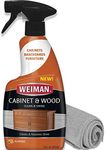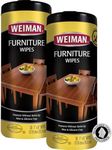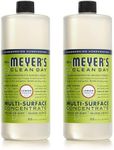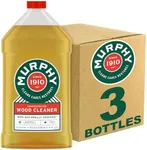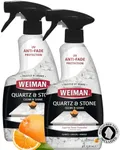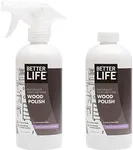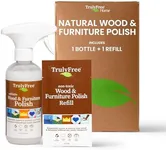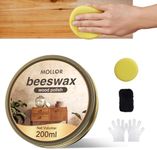Buying Guide for the Best Kitchen Cabinet Cleaners
Choosing the right kitchen cabinet cleaner is essential to maintain the beauty and longevity of your cabinets. The right cleaner will effectively remove grease, grime, and stains without damaging the finish or material of your cabinets. When selecting a kitchen cabinet cleaner, consider the type of cabinets you have, the ingredients in the cleaner, and any specific cleaning needs you may have. Here are some key specifications to help you make an informed decision.Type of CleanerThe type of cleaner refers to the form in which the product is available, such as liquid, spray, or wipes. This spec is important because it affects the ease of application and the type of cleaning you can perform. Liquid cleaners are versatile and can be used with a cloth or sponge, making them suitable for deep cleaning. Spray cleaners are convenient for quick and easy application, ideal for everyday use. Wipes are pre-moistened and disposable, perfect for spot cleaning and quick touch-ups. Choose the type that best fits your cleaning routine and preferences.
IngredientsThe ingredients in a cleaner determine its effectiveness and safety. This spec is crucial because some ingredients can be harsh and damage the finish of your cabinets, while others are gentle and safe for various surfaces. Cleaners with natural ingredients like vinegar, baking soda, and essential oils are eco-friendly and safe for most cabinet materials. Chemical-based cleaners may offer stronger cleaning power but can be abrasive. If you have children or pets, or if you prefer environmentally friendly products, opt for cleaners with natural ingredients. For tough stains and grease, a chemical-based cleaner might be more effective.
Surface CompatibilitySurface compatibility indicates which types of cabinet materials the cleaner is safe to use on. This spec is important because using the wrong cleaner can damage your cabinets. Common cabinet materials include wood, laminate, and painted surfaces. Some cleaners are formulated specifically for wood and contain oils that nourish and protect the wood. Others are designed for laminate or painted surfaces and are gentle enough to avoid stripping the finish. Identify the material of your cabinets and choose a cleaner that is compatible with it to ensure effective cleaning without damage.
Cleaning PowerCleaning power refers to the effectiveness of the cleaner in removing dirt, grease, and stains. This spec is important because it determines how well the cleaner will perform. Cleaners with high cleaning power can tackle tough grease and grime, making them suitable for heavily used kitchens. Moderate cleaning power is sufficient for regular maintenance and light cleaning. Low cleaning power cleaners are gentle and suitable for everyday use and minor spills. Consider the level of dirt and grease in your kitchen and choose a cleaner with the appropriate cleaning power to meet your needs.
ScentThe scent of a cleaner can enhance or detract from your cleaning experience. This spec is important because a pleasant scent can make cleaning more enjoyable, while a strong or unpleasant odor can be off-putting. Cleaners come in a variety of scents, from fresh and citrusy to floral and unscented. If you are sensitive to smells or prefer a neutral environment, opt for an unscented or lightly scented cleaner. If you enjoy a fresh-smelling kitchen, choose a cleaner with a scent that you find pleasant. The right scent can make your cleaning routine more pleasant and satisfying.
